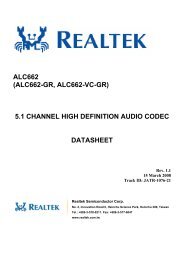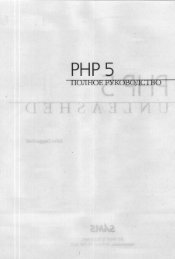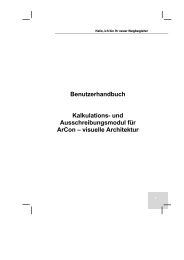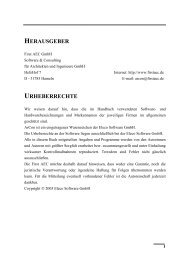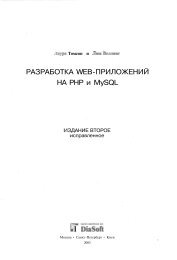- Page 2 and 3:
Narcissus and Daffodil
- Page 4 and 5:
Narcissus and Daffodil The genus Na
- Page 6 and 7:
Contents Preface to the series vii
- Page 8 and 9:
Preface to the series There is incr
- Page 10 and 11:
Preface My interest in flower-bulb
- Page 12 and 13:
Acknowledgements I would like to th
- Page 14 and 15:
Gordon R. Hanks Crop and Weed Scien
- Page 16 and 17:
Figures 1.1 The effect of bulb stor
- Page 18 and 19:
Figures/Plates xvii 7.8 Accumulatio
- Page 20:
Figures/Plates of different segment
- Page 23 and 24:
2 G.R. Hanks Information about the
- Page 25 and 26:
4 G.R. Hanks (1999), and the polysa
- Page 27 and 28:
3 2 4 1 1 3 2 4 5 Flowering in 1976
- Page 29 and 30:
8 G.R. Hanks Figure 1.6 Diagrammati
- Page 31 and 32:
10 G.R. Hanks (Rees, 1969). When fl
- Page 33 and 34: 12 G.R. Hanks Figure 1.8 The relati
- Page 35 and 36: 14 G.R. Hanks root system of commer
- Page 37 and 38: 16 G.R. Hanks Cremer, M.C., Beijer,
- Page 39 and 40: 18 G.R. Hanks Roh, S.M. and Lee, J.
- Page 41 and 42: 20 A.C. Dweck Figure 2.1 The narcis
- Page 43 and 44: 22 A.C. Dweck Julians Hertfordshire
- Page 45 and 46: 24 A.C. Dweck Herefordshire, if daf
- Page 47 and 48: 26 A.C. Dweck the basis of an ancie
- Page 49 and 50: 28 A.C. Dweck Britten, J. and Holla
- Page 51 and 52: 3 Classification of the genus Narci
- Page 53 and 54: (1) (2) (3)
- Page 55 and 56: 34 B. Mathew d. Section Jonquillae
- Page 57 and 58: 36 B. Mathew N. cyclamineus DC. Flo
- Page 59 and 60: 38 B. Mathew 1c. Section Ganymedes
- Page 61 and 62: 40 B. Mathew umbel, fragrant; peria
- Page 63 and 64: 42 B. Mathew recognition whatsoever
- Page 65 and 66: 44 B. Mathew Note: N. elegans shows
- Page 67 and 68: 46 B. Mathew ssp. praecox Gatt. and
- Page 69 and 70: (1) (2) (3) (4)
- Page 71 and 72: 50 B. Mathew Table 3.1 Horticultura
- Page 73 and 74: 52 B. Mathew RHS (1958) The Classif
- Page 75 and 76: 54 G.R. Hanks grown for galanthamin
- Page 77 and 78: 56 G.R. Hanks such as drying stores
- Page 79 and 80: Table 4.4 Areas of Narcissus cultiv
- Page 81 and 82: 60 G.R. Hanks Following planting in
- Page 83: 62 G.R. Hanks lost, resulting in th
- Page 87 and 88: Figure 4.1 Mean monthly weather dat
- Page 89 and 90: 68 G.R. Hanks (as well as natural e
- Page 91 and 92: 70 G.R. Hanks compaction and its ef
- Page 93 and 94: 72 G.R. Hanks bulbs with base rot)
- Page 95 and 96: 74 G.R. Hanks Figure 4.3 Modern fro
- Page 97 and 98: 76 G.R. Hanks caution. Higher rates
- Page 99 and 100: 78 G.R. Hanks can also be prevented
- Page 101 and 102: 80 G.R. Hanks Figure 4.4 A typical
- Page 103 and 104: 82 G.R. Hanks Planting date The pra
- Page 105 and 106: 84 G.R. Hanks Hanks and Jones, 1986
- Page 107 and 108: 86 G.R. Hanks On sloping sites, gro
- Page 109 and 110: 88 G.R. Hanks Insecticide and nemat
- Page 111 and 112: 90 G.R. Hanks bulb growth, especial
- Page 113 and 114: 92 G.R. Hanks Figure 4.7 Changes in
- Page 115 and 116: 94 G.R. Hanks methods have been tes
- Page 117 and 118: 96 G.R. Hanks the boxes, exiting at
- Page 119 and 120: 98 G.R. Hanks usually collected in
- Page 121 and 122: 100 G.R. Hanks respond to ethylene
- Page 123 and 124: 102 G.R. Hanks using thiabendazole
- Page 125 and 126: 104 G.R. Hanks required for the eff
- Page 127 and 128: 106 G.R. Hanks and cross-cutting, s
- Page 129 and 130: 108 G.R. Hanks In practice, moulds
- Page 131 and 132: 110 G.R. Hanks that, with enterpris
- Page 133 and 134: 112 G.R. Hanks Balatková, V., Tupy
- Page 135 and 136:
114 G.R. Hanks (Narcissus pseudonar
- Page 137 and 138:
116 G.R. Hanks Flint, G.J. (1983) E
- Page 139 and 140:
118 G.R. Hanks Hanks, G.R. and Rees
- Page 141 and 142:
120 G.R. Hanks Khatib, K. al (1996)
- Page 143 and 144:
122 G.R. Hanks Luyten, I. (1935) Ve
- Page 145 and 146:
124 G.R. Hanks O’Neill, T.M., Man
- Page 147 and 148:
126 G.R. Hanks Ruamrungsri, S., Rua
- Page 149 and 150:
128 G.R. Hanks Thompson, P.A. (1977
- Page 151 and 152:
130 G.R. Hanks Williams, M. (1996)
- Page 153 and 154:
132 J.B. Briggs Table 5.1 Typical g
- Page 155 and 156:
134 J.B. Briggs Table 5.3 Actual gr
- Page 157 and 158:
136 J.B. Briggs Table 5.4 Actual co
- Page 159 and 160:
138 J.B. Briggs Table 5.5 Capital c
- Page 161 and 162:
140 J.B. Briggs ADAS (1987a) Narcis
- Page 163 and 164:
142 J. Bastida and F. Viladomat Fig
- Page 165 and 166:
Table 6.1 Narcissus alkaloid struct
- Page 167 and 168:
Table 6.1b Continued Alkaloid name
- Page 169 and 170:
Table 6.1d Tazettine type O O R1 R2
- Page 171 and 172:
Table 6.1f Continued MeO Alkaloid n
- Page 173 and 174:
Table 6.2 Continued Species* Alkalo
- Page 175 and 176:
Table 6.2 Continued Species* Alkalo
- Page 177 and 178:
Table 6.2 Continued Species* Alkalo
- Page 179 and 180:
Table 6.2 Continued Species* Alkalo
- Page 181 and 182:
Table 6.2 Continued Species* Alkalo
- Page 183 and 184:
162 J. Bastida and F. Viladomat Tab
- Page 185 and 186:
164 J. Bastida and F. Viladomat Fig
- Page 187 and 188:
166 J. Bastida and F. Viladomat Fig
- Page 189 and 190:
168 J. Bastida and F. Viladomat Fig
- Page 191 and 192:
170 J. Bastida and F. Viladomat Fig
- Page 193 and 194:
Table 6.3 Continued Alkaloid* Formu
- Page 195 and 196:
Table 6.3 Continued Alkaloid* Formu
- Page 197 and 198:
176 J. Bastida and F. Viladomat Tab
- Page 199 and 200:
178 J. Bastida and F. Viladomat Cri
- Page 201 and 202:
180 J. Bastida and F. Viladomat It
- Page 203 and 204:
182 J. Bastida and F. Viladomat Fig
- Page 205 and 206:
184 J. Bastida and F. Viladomat is
- Page 207 and 208:
186 J. Bastida and F. Viladomat and
- Page 209 and 210:
Table 6.4 Continued Alkaloid Activi
- Page 211 and 212:
Table 6.4 Continued Alkaloid Activi
- Page 213 and 214:
Table 6.4 Continued Alkaloid Activi
- Page 215 and 216:
Table 6.4 Continued Alkaloid Activi
- Page 217 and 218:
196 J. Bastida and F. Viladomat tac
- Page 219 and 220:
198 J. Bastida and F. Viladomat Ang
- Page 221 and 222:
200 J. Bastida and F. Viladomat Boi
- Page 223 and 224:
202 J. Bastida and F. Viladomat lyc
- Page 225 and 226:
204 J. Bastida and F. Viladomat Fug
- Page 227 and 228:
206 J. Bastida and F. Viladomat Han
- Page 229 and 230:
208 J. Bastida and F. Viladomat Kin
- Page 231 and 232:
210 J. Bastida and F. Viladomat of
- Page 233 and 234:
212 J. Bastida and F. Viladomat Sp
- Page 235 and 236:
214 J. Bastida and F. Viladomat Wil
- Page 237 and 238:
216 C. Codina and, consequently, hi
- Page 239 and 240:
218 C. Codina easily lost on transf
- Page 241 and 242:
220 C. Codina they might be more su
- Page 243 and 244:
222 C. Codina µ g/g FW µ g/g FW 3
- Page 245 and 246:
224 C. Codina Kinetin As observed i
- Page 247 and 248:
226 C. Codina Table 7.3 Total produ
- Page 249 and 250:
228 C. Codina Accumulation of alkal
- Page 251 and 252:
230 C. Codina Accumulation of alkal
- Page 253 and 254:
232 C. Codina Effect on growth and
- Page 255 and 256:
234 C. Codina mg/g DW mg/g DW 0.90
- Page 257 and 258:
236 C. Codina mg/g DW mg/g DW 1.4 1
- Page 259 and 260:
238 C. Codina mg/g DW mg/g DW 1.5 1
- Page 261 and 262:
240 C. Codina Hanks, G.R. and Jones
- Page 263 and 264:
8 Narcissus and other Amaryllidacea
- Page 265 and 266:
244 O.A. Cherkasov and O.N. Tolkach
- Page 267 and 268:
246 O.A. Cherkasov and O.N. Tolkach
- Page 269 and 270:
248 O.A. Cherkasov and O.N. Tolkach
- Page 271 and 272:
250 O.A. Cherkasov and O.N. Tolkach
- Page 273 and 274:
252 O.A. Cherkasov and O.N. Tolkach
- Page 275 and 276:
254 O.A. Cherkasov and O.N. Tolkach
- Page 277 and 278:
9 Studies on galanthamine extractio
- Page 279 and 280:
258 M. Kreh Table 9.1 Results of ga
- Page 281 and 282:
260 M. Kreh relation to the qualita
- Page 283 and 284:
262 M. Kreh Figure 9.3 Galanthamine
- Page 285 and 286:
264 M. Kreh 2.0 flower 2 1 3 4 0 10
- Page 287 and 288:
266 M. Kreh • High purity of the
- Page 289 and 290:
268 M. Kreh fraction of Narcissus
- Page 291 and 292:
H O MeO O MeO H H HO H (1) (3) + 2
- Page 293 and 294:
272 M. Kreh Gorinova, N.I., Atanass
- Page 295 and 296:
274 R.M. Moraes (Katz and Taneck, 1
- Page 297 and 298:
276 R.M. Moraes bulbs of many Narci
- Page 299 and 300:
278 R.M. Moraes Galanthamine conten
- Page 301 and 302:
280 R.M. Moraes Table 10.2 The effe
- Page 303 and 304:
282 R.M. Moraes years, a yield of 1
- Page 305 and 306:
284 R.M. Moraes Kosley, R.W., Jr.,
- Page 307 and 308:
11 Extraction and quantitative anal
- Page 309 and 310:
288 N.P.D. Nanayakkara and J.K. Bas
- Page 311 and 312:
290 N.P.D. Nanayakkara and J.K. Bas
- Page 313 and 314:
292 N.P.D. Nanayakkara and J.K. Bas
- Page 315 and 316:
294 N.P.D. Nanayakkara and J.K. Bas
- Page 317 and 318:
Table 11.1 GC and HPLC procedures f
- Page 319 and 320:
Table 11.1 Continued References Det
- Page 321 and 322:
300 N.P.D. Nanayakkara and J.K. Bas
- Page 323 and 324:
302 N.P.D. Nanayakkara and J.K. Bas
- Page 325 and 326:
12 Synthesis of galanthamine and re
- Page 327 and 328:
306 V.N. Bulavka and O.N. Tolkachev
- Page 329 and 330:
308 V.N. Bulavka and O.N. Tolkachev
- Page 331 and 332:
310 V.N. Bulavka and O.N. Tolkachev
- Page 333 and 334:
312 V.N. Bulavka and O.N. Tolkachev
- Page 335 and 336:
314 V.N. Bulavka and O.N. Tolkachev
- Page 337 and 338:
316 V.N. Bulavka and O.N. Tolkachev
- Page 339 and 340:
318 V.N. Bulavka and O.N. Tolkachev
- Page 341 and 342:
320 V.N. Bulavka and O.N. Tolkachev
- Page 343 and 344:
322 V.N. Bulavka and O.N. Tolkachev
- Page 345 and 346:
324 V.N. Bulavka and O.N. Tolkachev
- Page 347 and 348:
326 V.N. Bulavka and O.N. Tolkachev
- Page 349 and 350:
328 V.N. Bulavka and O.N. Tolkachev
- Page 351 and 352:
330 V.N. Bulavka and O.N. Tolkachev
- Page 353 and 354:
13 Compounds from the genus Narciss
- Page 355 and 356:
334 D. Brown with neostigmine the a
- Page 357 and 358:
336 D. Brown Absorption Galanthamin
- Page 359 and 360:
338 D. Brown Metabolism and excreti
- Page 361 and 362:
340 D. Brown were internationally i
- Page 363 and 364:
342 D. Brown cortex and hippocampus
- Page 365 and 366:
344 D. Brown reasoned that the effi
- Page 367 and 368:
346 D. Brown Galanthamine causes br
- Page 369 and 370:
348 D. Brown (1994) go on to mentio
- Page 371 and 372:
350 D. Brown (Punto Toro and Rift V
- Page 373 and 374:
352 D. Brown Furusawa, E., Lum, M.K
- Page 375 and 376:
354 D. Brown Snorrason, E. and Stef
- Page 377 and 378:
356 D. Brown examination of a brain
- Page 379 and 380:
358 D. Brown A successful cholinerg
- Page 381 and 382:
Table 14.2 Summary of human trials
- Page 383 and 384:
362 D. Brown statistically signific
- Page 385 and 386:
364 D. Brown ( Jann, 1998); see Tab
- Page 387 and 388:
366 D. Brown REFERENCES Bartus, B.T
- Page 389 and 390:
368 D. Brown Wilcock, G.K., Scott,
- Page 391 and 392:
370 K. Ingkaninan, H. Irth and R. V
- Page 393 and 394:
372 K. Ingkaninan, H. Irth and R. V
- Page 395 and 396:
374 K. Ingkaninan, H. Irth and R. V
- Page 397 and 398:
376 K. Ingkaninan, H. Irth and R. V
- Page 399 and 400:
378 K. Ingkaninan, H. Irth and R. V
- Page 401 and 402:
16 Narcissus lectins Els J.M. Van D
- Page 403 and 404:
382 E.J.M. Van Damme and W.J. Peuma
- Page 405 and 406:
384 E.J.M. Van Damme and W.J. Peuma
- Page 407 and 408:
386 E.J.M. Van Damme and W.J. Peuma
- Page 409 and 410:
388 E.J.M. Van Damme and W.J. Peuma
- Page 411 and 412:
390 E.J.M. Van Damme and W.J. Peuma
- Page 413 and 414:
17 Narcissus in perfumery HISTORY C
- Page 415 and 416:
394 C. Remy Figure 17.2 Flower coll
- Page 417 and 418:
Figure 17.3 Narcissus flowers sprea
- Page 419 and 420:
398 C. Remy CONCLUSION The use of n
- Page 421 and 422:
400 C.G. Julian and P.W. Bowers Fig
- Page 423 and 424:
402 C.G. Julian and P.W. Bowers Fig
- Page 425 and 426:
404 C.G. Julian and P.W. Bowers Fig
- Page 427 and 428:
406 C.G. Julian and P.W. Bowers sym
- Page 429 and 430:
19 Review of pharmaceutical patents
- Page 431 and 432:
410 J.R. Murray to certain RNA viru
- Page 433 and 434:
412 J.R. Murray occurs in a two-pha
- Page 435 and 436:
414 J.R. Murray cognitive function
- Page 437 and 438:
416 J.R. Murray given at a time bet
- Page 439 and 440:
418 J.R. Murray Hofmannor, D., Mosc
- Page 441 and 442:
420 Index Backache, 403 Bacterial d
- Page 443 and 444:
422 Index Divisions (classification
- Page 445 and 446:
424 Index Leaf numbers, 11 Leaf sco
- Page 447 and 448:
426 Index Poet’s cultivars, 34 Po
- Page 449:
428 Index Subgenus (taxonomy); Ajax



